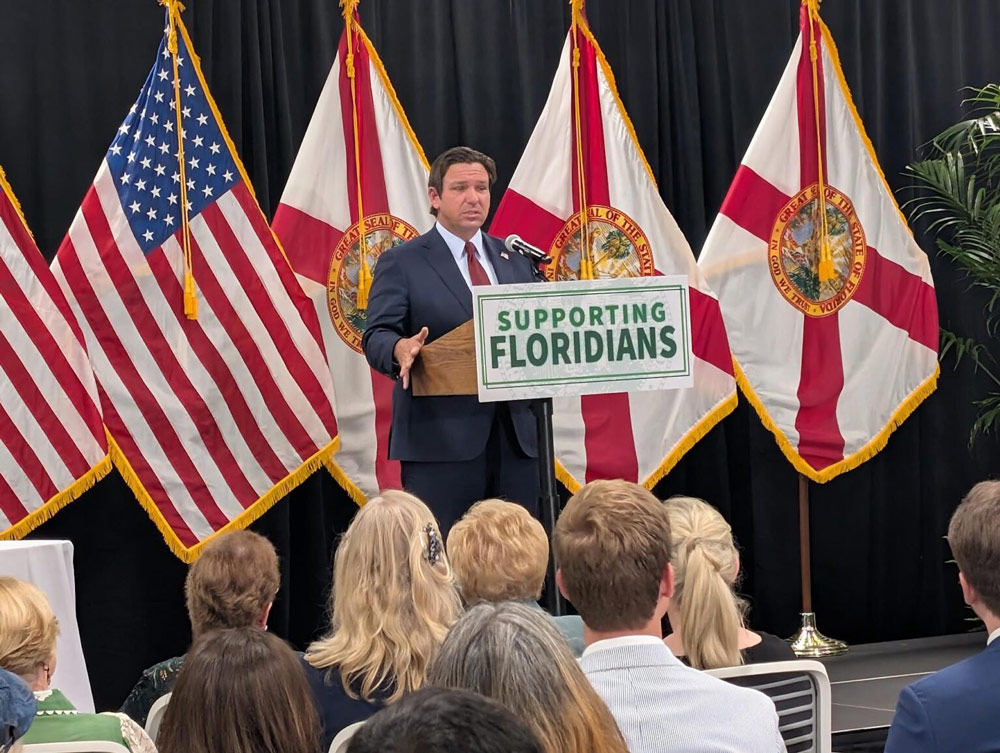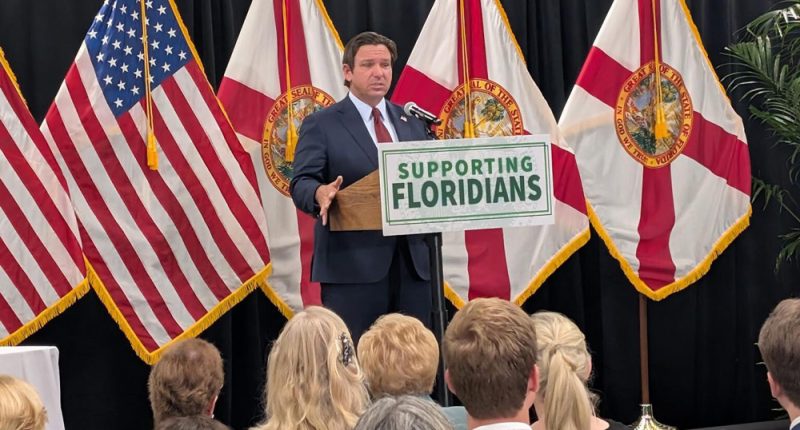
Gov. Ron DeSantis said Wednesday that the temporary detention center being constructed at an isolated Everglades airfield will have “zero impact” on Everglades restoration, rebuking concerns by environmental advocates and local officials who say the project threatens drinking water and protected land.
Miami-Dade County Mayor Daniella Levine Cava said this week in a written statement that her office has “significant concerns about the scope and scale of the state’s efforts, particularly regarding the environmental safeguards in place given the potentially devastating impact to the Everglades.”
DeSantis scoffed at those remarks while appearing at a bill-signing event in Tampa on Wednesday, contending the opposition from critics stems from their antipathy to the crackdown on undocumented immigrants by the Trump administration.
“I think people are just — they’re trying to use the Everglades as a pretext, just for the fact that they oppose immigration enforcement,” he said.
“I mean, let’s be clear. That’s where you are from the far left now. They don’t want the laws enforced at all, and you’re seeing that with some of the demonstrations and some of the other things. You have a right to have that view, but that is not the policy of the United States of America. That is not the policy of the state of Florida.”
The Sierra Club and Friends of the Everglades are among the organizations that have come out in opposition to the project.
“This proposal is not only deeply inhumane, it is profoundly irresponsible from an environmental, ethical, and fiscal standpoint,” said Javier Estevez, political and legislative director for the Sierra Club Florida.
 “The Everglades is a unique and fragile ecosystem — a UNESCO World Heritage Site, home to countless endangered species, and a vital source of drinking water for more than nine million Floridians. To pave over a portion of this irreplaceable landscape for a high‑security prison is nothing short of ecological vandalism.”
“The Everglades is a unique and fragile ecosystem — a UNESCO World Heritage Site, home to countless endangered species, and a vital source of drinking water for more than nine million Floridians. To pave over a portion of this irreplaceable landscape for a high‑security prison is nothing short of ecological vandalism.”
On Sunday, Friends of the Everglades held a protest against the plan at the abandoned Everglades Jetport in the Big Cypress National Preserve. They are directing their members to urge the governor and Florida Attorney General James Uthmeier to back off the plan.
Both groups responded on Wednesday to DeSantis’ comments.
“This site is an inappropriate location for a detention facility precisely because it is in the heart of the Everglades, within Big Cypress National Preserve,” said Eve Samples, executive director of Friends of the Everglades, in a statement.
“The problems with a prison on this site have nothing to do with immigration enforcement. They have to do with protecting the state and federal investment in the Everglades by not building facilities to house thousands of detainees and bringing associated impacts. Florida panther tracking data shows panthers have been detected on the very airstrip where the state of Florida is moving prison equipment right now. Wetlands impacts, endangered species impacts, light pollution and other environmental concerns have not been sufficiently analyzed. The Everglades deserve better.”
“Governor DeSantis is wrong to dismiss serious environmental concerns about the ‘Alligator Alcatraz’ detention site,” said Marcelo Balladares, Everglades organizing representative for the Sierra Club.
“The Everglades is not a staging area for mobile infrastructure — it is a fragile and irreplaceable ecosystem that is central to the health, heritage, and future of Florida. Even ‘temporary’ installations can have long-lasting impacts, introducing pollution, disrupting water flows, and threatening endangered species and habitats that have worked hard to protect. The governor has repeatedly claimed to be a defender of the Everglades; now is the moment for him to prove it.”
DeSantis confirmed on Wednesday that the federal government will pay all of the costs of constructing and maintaining the facility, which is expected to provide as many as 1,000 beds to hold undocumented migrants once it is completed, according to a video posted last week on social media by Uthmeier.
DeSantis added that the state will soon begin work on “something similar” at Camp Blanding Joint Training Center near Starke, which serves as the primary military reservation and training base for the Florida National Guard.
Everglades money
The governor expressed incredulity that anyone could claim that in backing this plan he was somehow working to set back Everglades restoration.
“You’re talking about the guy who’s plowed how much money into Everglades restoration?” DeSantis said rhetorically when asked about concerns that the detention facility could harm Everglades restoration.
“In fact, [Senate President] Ben Albritton and I had to fight to get Everglades fully funded [this year]. The original House budget print in the Florida House cut half a billion dollars out of Everglades restoration.”
The budget passed by the Legislature last week includes $810 million for Everglades restoration, the largest single-year commitment in the state’s history. DeSantis had offered $805 million in his original proposed budget, but the House proposed allocating just $357 million. Going into this year, the DeSantis administration announced that it had devoted $6.5 billion for Everglades restoration since he entered office in January 2019.
DeSantis is using emergency powers to gain control of the land, after his administration offered to buy it from the county. The Florida Department of Emergency Management offered to purchase the land for $20 million, but Miami-Dade County Mayor Daniella Levine Cava gave a counteroffer of $190 million, leading DeSantis’ office to describe the request as “unreasonable.”
The Phoenix asked DeSantis whether it is possible for the two parties to negotiate an agreed upon price.
“They’ve been working on it,” he said. “I think that response is more posturing for the stuff, but this is actually a Collier-Dade Airport that’s there. We use it for emergencies. It ain’t like we’re creating something new. It’s a way to do this in conjunction with the federal government, who’s funding it in a way that’s not going to have impacts on our broader community.”
–Mitch Perry, Florida Phoenix











